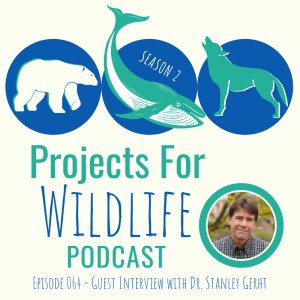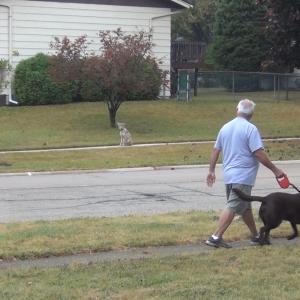The project has provided training and support for multiple young researchers, including postdocs and graduate students
Postdoctoral researchers who have worked on Cook County projects:
- Dr. Suzie Prange (2003-2005)
- Dr. Benjamin Hirsch (2011-2014)
- Dr. Hance Ellington (2015-2020)
- Dr. Charlotte Milling (2017-current)
Current and completed Graduate Students whose graduate work focused on Cook County research (raccoon rabies, coyote ecology, wildlife disease, etc):
| Student | Degree | Date | Institution | Thesis / Dissertation |
|---|---|---|---|---|
| Grayson Cahal | MS | In Prog. | Ohio State Univ. | Intra- and interpopulation variation in coyote behavior |
| Emily Zepeda | PhD | In Prog. | UC-Davis | Identifying the social and landscape characteristics influencing coyote behavior and fitness correlates in an urban environment |
| Zoe Rossman | PhD | In Prog. | Univ. New Mexico | Mesopredator niche space in an urban system |
| Katie Worsley-Tonks | PhD | 2020 | Univ. Minnesota | The transmission of antibiotic-resistant and non-resistant E. Coli between domestic dogs, raccoons, and coyotes in urban and suburban areas |
| Gretchen Anchor | MS | 2019 | Ohio State Univ. | Impacts of coyotes (Canis latrans) on white-tailed deer (Odocoileus virginianus) behavior and mortality in the Chicago Region |
| Ashley Wurth | PhD | 2018 | Ohio State Univ. | Effects of urbanization on behavior and genetics of coyotes |
| Katie Robertson | PhD | 2018 | Ohio State Univ. | Behavioral syndromes in urban coyotes |
| Evan Wilson | MS | 2012 | Ohio State Univ. | The dynamics of Sarcoptic mange in an urban coyote (Canis latrans) population |
| Jennifer Thieme | MS | 2012 | Ohio State Univ. | Behavioral and reproductive consequences of predator activity to grassland birds |
| Stephanie Hauver | MS | 2008 | Ohio State Univ. | Genetic determinants of raccoon social behavior in a highly urbanized environment |
| Alison Willingham | MS | 2008 | Ohio State Univ. | Status and distribution of gray foxes and interactions with coyotes |
| Bill Graser | MS | 2008 | Ohio State Univ. | Landscape effects on raccoon population demographics and disease dynamics |
| Cecelia Hennessy | MS | 2007 | Ohio State Univ. | Mating strategies and pack structure of coyotes in an urban landscape: a genetic investigation |
| Justin Brown | MS | 2007 | Ohio State Univ. | Coyote predation on Canada Goose nests: A biological control? |
| Paul Morey | MS | 2004 | Utah State Univ. | Coyote space use and diet in the Chicago Metropolitan Area |
| Suzie Prange | PhD | 2002 | Univ. Missouri | Effects of urbanization on raccoon (Procyon lotor) population demographics, home range, and spatial distribution patterns |
Journal articles authored by Postdocs
- Ellington, EH, SD Gehrt. 2019. Behavioral responses by an apex predator to urbanization. Behavioral Ecology 30: 821-829.
- Hirsch BT, JJH Reynolds, ME Craft, and SD Gehrt. 2016. Which mechanisms drive seasonal rabies outbreaks in raccoons? A test using dynamic social network models. Journal of Applied Ecology 53:804-813.
- Reynolds, J.J.H., B.T. Hirsch, S.D. Gehrt and M.E. Craft. 2015. Raccoon contact networks predict seasonal susceptibility to rabies outbreaks and limitations of vaccination. Journal of Animal Ecology 84:1720-1731.
- Hirsch, B.T., S. Prange, S.A. Hauver, & S.D. Gehrt. 2014. Patterns of latrine use by individual raccoons and the implication for Baylisascaris procyonis transmission. Journal of Wildlife Diseases 50:243-249.
- Hirsch, B.T , S. Prange, S.A Hauver, & S.D Gehrt. 2013. Raccoon social networks and the potential for disease transmission. PLoS ONE 8(10): e75830. doi:10.1371/journal.pone.0075830.
- Hirsch, B.T., S. Prange, S.A. Hauver, & S.D. Gehrt. 2013. Genetic relatedness does not predict raccoon social network structure. Animal Behaviour 85:463-470.
- Prange, S., S.D. Gehrt, and S.Hauver. 2011. Frequency and duration of contacts between free-ranging raccoons: uncovering a hidden social system. Journal of Mammalogy 92:1331-1342.
- Prange, S., and S. D. Gehrt. 2007. Skunk response to simulated coyote activity: A test of the mesopredator release hypothesis. Journal of Mammalogy 88:1040-1049.
- Prange, S., T. Jordan, C. Hunter, and S. D. Gehrt. 2006. New radiocollars for the detection of proximity between individuals. Wildlife Society Bulletin 34:1333-1344.
- Prange, S., and S. D. Gehrt. 2004. Changes in mesopredator community structure in response to urbanization. Canadian Journal of Zoology 82:1804-1817.
Graduate Student Publications
- Worsley-Tonks KEL, TJ Johnson, CL Anchor, JB Bender, SD Gehrt, EA Miller, RS Singer, ME Craft. In press. Importance of anthropogenic sources at shaping the antimicrobial resistance profile of a peri-urban mesocarnivore. Science of the Total Environment.
- Worsley-Tonks K., Miller E., Gehrt S., McKenzie S., Travis D., Johnson T., Craft M. 2020. Characterization of antimicrobial resistance genes in the enriched Enterobacteriaceae community of suburban mesocarnivores, stray dogs and owned dogs. Zoonosis and Public Health, in press. https://doi.org/10.1111/zph.12691
- Wurth, AM, EH Ellington, SD Gehrt. 2020. Golf courses as potential habitat for urban coyotes. Wildlife Society Bulletin 44:333-341.
- Thieme, JL, AD Rodewald, J Brown, C Anchor, SD Gehrt. 2015. Linking grassland and early successional bird territory density to predator activity in urban parks. Natural Areas Journal 35:515-532.
- Hauver, S.A., B.T. Hirsch, S. Prange, & S.D. Gehrt. 2013. Age, but not sex or genetic relatedness, shapes raccoon dominance patterns. Ethology 119:769-778.
- Gese, E.M., P.S. Morey, and S.D. Gehrt. 2012. Influence of the urban matrix on space use of coyotes in the Chicago Metropolitan Area. Journal of Ethology 30:413-425. DOI 10.1007/s10164-012-0339-8.
- Hennessy, C.A., J. Dubach, and S. D. Gehrt. 2012. Long-Term pair bonding and genetic evidence for monogamy among urban coyotes (Canis latrans). Journal of Mammalogy 93:732-742.
- Graser, W.H., S.D. Gehrt, L.L. Hungerford, and C. Anchor. 2012. Variation in demographic patterns and population structure of raccoons across an urban landscape. Journal of Wildlife Management 76:976-986.
- Hauver, S.A., S.D. Gehrt, S.Prange, and J. Dubach. 2010. Behavioral and genetic aspects of the raccoon mating system. Journal of Mammalogy 91:749-757.
- Hauver, S.A., S.D. Gehrt, and S.Prange. 2010. Maternal behavior of raccoons and response of mothers to conspecific visits at natal dens. American Midland Naturalist 163:374-387.
- Morey, P.S., E. M. Gese, and S. D. Gehrt. 2007. Spatial and temporal variation in the diet of coyotes in the Chicago metropolitan area. American Midland Naturalist 158:147-161.
- Prange, S., S. D. Gehrt, and E. P. Wiggers. 2004. Influences of anthropogenic resources on raccoon (Procyon lotor) movements and spatial distribution. Journal of Mammalogy 85:483-490.
- Prange, S., S. D. Gehrt, and E. P. Wiggers. 2003. Demographic factors contributing to high raccoon densities in urban landscapes. Journal of Wildlife Management 67:324-333.


